Top Ten Major Events of the French Revolution
The French Revolution was a major Revolution in France from 1789 to 1799. This time period was very interesting from all standpoints. The French Revolution would be a very good show on TV. This list will cover the top ten major events from this Revolution. This list will only include events from France during the time and events pertaining to France. Feel free to add whatever item you feel is deserving. I hope you enjoy!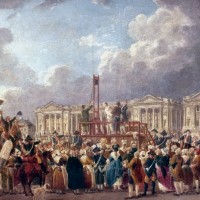
From September of 1793 to July of 1794, France underwent a very dark period. Maximilien Robespierre and his radical Jacobin Club had taken over the government. They would silence all opposition to their cause. Whether that be nobles, religious leaders, people loyal to the King, and even moderates. If you did oppose the government you was convicted of treason and executed by way of the guillotine, an innovative creation that perfected the art of murder. It was quick and painless. At least 17,000 people were executed and at least 10,000 died in prison. No one was safe from the government. 1 out of 50 Frenchmen were executed. It was a time of terror and it was the darkest and deadliest point of the Revolution. Censorship in its highest form. Plus some of the ideas at the time were very weird. They got rid of the Caesar calendar, because it was used by the old France. They got rid of all symbols of old France. People thought Robespierre was Moses. Just weird times.
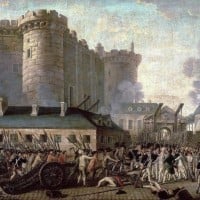
The Storming of the Bastille is simply iconic. Us Americans have the Boston Tea Party, the French have the Storming of the Bastille. A mob of angry Paris citizens on July 14th, 1789 attacked the Bastille Prison in search of ammunition. It resulted in 98 deaths. The Bastille Storming would show that the French Third Estate was serious about Revolution. This event would even end up becoming a holiday in France and to people seeing liberty and freedom. It is generally seen as the first conflict in the Revolution.
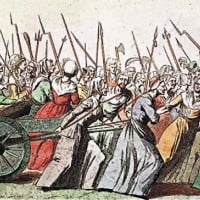
On October 5th a lot of the Third Estate oppression happened in Paris. The royal family lived in Versailles. The Third Estate was starving. Thousands of women marched the thirteen mile walk to Versailles. They sought to bring the King back to Paris and kill the Queen, who lived luxuriously and was out of touch with the people. The Queen was nearly murdered, but eventually the Royal Family was escorted back to Paris by the National Guards and thousands of protesters carrying the Versailles's guards heads on pikes. The first example of extreme violence in the revolution and it foreshadowed the atrocities to come.
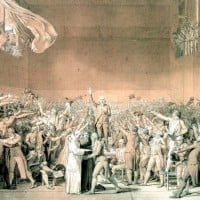
On June 20th 1789, after King Louis XVI had started to lock the new National Assembly out of their meeting buildings, a group of Third Estate citizens and higher Estate citizens sympathetic to the cause, they knew they needed to change things. They found an empty tennis court and they vowed to stay together until a new constitution was drafted by the government. This would prove vital in the future and showed a commitment to freedom and liberty. Without this, government change would never happen.
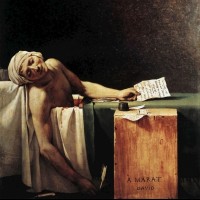
I believe that the murder of Jean-Paul Marat was the spark that lit the Reign of Terror. Marat was a Scientist confined to a tub because of a skin condition. He spent all his time writing and his writings were very, very, very, very radical. He called for the murders of French nobles and a coup of the government. He was a lunatic. If anyone disagreed they were to immediately be tried and executed. On July 13th, 1793, Charlotte Corday, a Third Estate woman who was upset with what was happening, claimed she had a list of anti revolutionaries. Well she was invited to his house and she murdered him. Unfortunately Marat was even more powerful dead. He would become a martyr and was glorified as Jesus like.
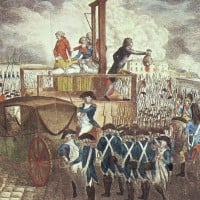
Maximilian Robespierre is like the main character of the French Revolution. He was the leader of the Reign of Terror and was considered Moses like. In the beginning he was adored, but towards the end he went utterly mad. He thought everyone was out to get him. He was the most powerful man in the Revolution. He would write down people that were suspect and they were tried and most of the time murdered. No one was protected by Robespierre's list, not even Robespierre himself. After his fellow authoritative figures figured out they were going to be executed, they executed Robespierre first on July 24th, 1794. That would end the Reign of Terror.
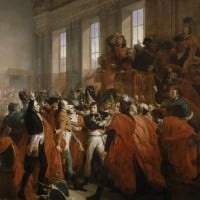
Napoleon Bonaparte was a very popular general during the French Revolution. He very rarely lost a battle and he brought glory to France in dark days. Upon his return from Egypt, he saw Paris in a weak state. Some members of the Government also sought stability. So on November 9th, 1799, Napoleon and his army stormed the Capitol. He basically forced everyone to step down and they named him consul after tense debate and a few punches thrown. Amazingly not a single death happened. This coup would make Napoleon the undisputed leader for decades. It would end the French Revolution and lead to peace. (Despite what historians tell you, Napoleon was a great leader and a man of the people).
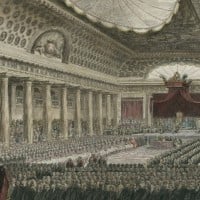
France was in financial distress after centuries of war and the lavish living of the first and second Estates. As a result, the King called the very rare Estates General. In the Estates General, every estate had one vote. The third estate, which encompassed 97 percent of the population, was out voted on everything. This would inequality and lack of representation would lead to the French Revolution.
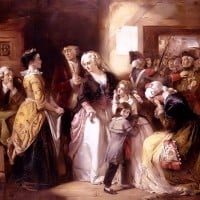
Tired of being captive to Revolutionaries, the Royal Family attempted to escape on the night of June 20th, 1790 from Palace Tuileries. They sought to go to Austria, the country of Marie Antoinette, and stage a counter revolution. They were caught however in Varennes and they were sent back to Paris. This would anger the Revolutionaries. It would further distance the Royal Family from the people and the public trust in nobility. In 1793 King Louis XVI would be executed and Marie Antoinette in 1793 as well.
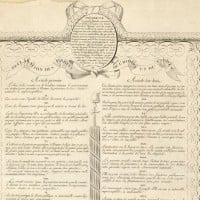
The Declaration of the Right of Man was the Constitution that was made in 1789. This document would be groundbreaking. It was drafted by Abbé Emmanuel Joseph Sieyès and the Marquis de Lafayette. Thomas Jefferson would also consult. This document declared all men, and yes only men unfortunately, are born free and equal. I encourage you to look at the full 17 rights is provides. It is a very good document. I hope you liked this list. Feel free to remix, comment, add items, or even share. Thank you!